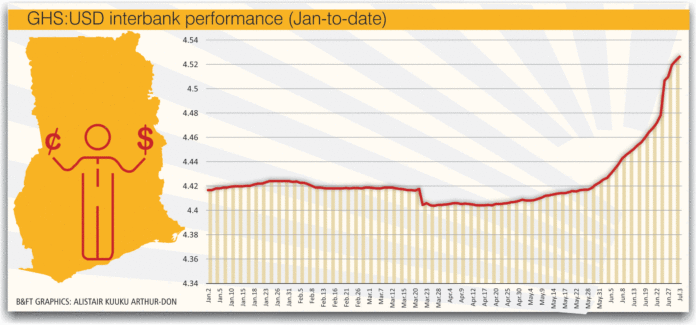Despite a strong start to the year, the local currency has come under intense pressure from the US dollar resurrecting the woes of the cedi against its major trading partners.
Data from the central bank shows that the cedi held the dollar in check till mid-May when pressure resurrecting from the rise in the US interest rates, rise in crude oil prices among other external pressures exerted pressure on the local currency.
The BoG interbank data shows that the cedi has depreciated by 2.4 percent against the dollar as at July 3 with the downward slide only commencing on May 18. Same period last year, the cedi had depreciated by 3.6 percent.
Compared to last year’s performance, it would seem that the cedi’s performance is not given the needed credit it deserves. However, the cedi’s troubled performance is more glaring outside the interbank market where most transactions are likely to take place.
While the BoG interbank rate is quoting the dollar as selling at GH¢4.5265 as at yesterday, according to Reuters the greenback is selling at GH¢4.8250 on the local markets. The market analysts also report that their data point to a 5.3 percent depreciation in the first half of the year compared to the 3.3 percent it recorded same period last year.
Data from Bloomberg which monitors the performance of currencies appear even grimmer – the cedi as at yesterday had reached a year-to-date depreciation of more than 5.97 percent against the dollar.
In addition to the cedi having to deal with the external pressures, market analysts say the domestic market reaction to the MTN IPO launched in June — which said the GHS3.48 billion to be raised will be used to settle shareholders who mostly reside outside the country — is giving the cedi the jitters.
Steve Opata, Director, Financial Markets Department at the central bank weeks ago confirmed the threats posed by MTN IPO to the fortunes of the cedi revealing that the central bank had engaged MTN to mitigate whatever impact that may arise.
“Assurance from MTN to treasury managers in banks about no immediate plans to externalize [repatriate] these payments should mute that aspect of market sentiments. The BoG is engaging the management of MTN Ghana to ensure that any FX outflows arising from this transaction is done in a phased and orderly manner,” Mr. Opata said.
More liquidity, other measures
The Director, Financial Markets Department of the central bank said the bank over the months has made sure there is enough liquidity to cater for any shortfall that will lead to the cedi to come under the pressure against the dollar.
Mr. Opata who spoke to the B&FT early last month revealed that the central bank is increasing its forex supply to the market. The recent Eurobond, he said, has provided additional forex to the central bank which could be called upon to help the forex market.
He maintained that the central bank is monitoring keenly the current happenings both externally and domestically and would not hesitate to use its monetary policy tool to bring the desired change to the local market.
“While these global and domestic developments do not yet pose a threat to inflation in Ghana in the near term, the BoG is monitoring the situation to take appropriate policy actions as required,” he added.
Despite these assurances made a month ago, the cedi continues to reach new lows meaning that the central bank will have to dig deeper to stem the slide which has now become synonymous to the local currency.





